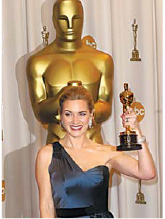To further see how buddy-buddy Cannes has become, take a look at this year's winners. The coveted Palm went to Michael Haneke for The White Ribbon. The Austrian director had previously won for Cache and so was already "on the inside" but a bigger factor was the fact that Isabelle Hupert was president of this year's jury. And Huppert was Cannes' 2001 best actress for The Piano Teacher, which Haneke directed and which also won the Grand Prix, equivalent to runner-up to Best Picture. If you were Huppert, wouldn't you use your power and influence to get your friend the coveted prize? I would - unless the movie was a total disappointment.
Huppert's fellow jury members have been quoted describing her as a "fascist", which could mean only one thing: She was determined her friend would win. That does not mean the movie did or did not deserve the Golden Palm. It just sheds light on the voting process, which is anything but democratic. If it's a panel of nine people, as it was at Cannes this year, it could not possibly be democratic. People are bound to be swayed.

Judging from the results, China's Shu Qi and South Korea's Lee Chang-dong also exerted a lot of influence.
Although Asian movies got only minor awards - Filipino Brillante Mendoza's best director prize for his rape-and-dismemberment drama Kinatay, Chinese director Lou Ye's best screenplay for Spring Fever and South Korean Park Chan-wook's share of the jury prize for his vampire story Thirst - their announcement is said to have drawn heavy booing from the assembled media. I'm not suggesting journalists are always right - maybe a larger Asian news corps would have tipped the response from jeers to cheers - but it shows how, in an event dominated by a few well-connected and persuasive people, a few can make or break a movie's chances regardless of its quality.
Cannes has over time shown great insight and courage - it gave its top nod to Apocalypse Now, arguably one of the best war movies ever - but it has also shown an inordinate amount of inertia. It often goes for mediocre works by top-notch filmmakers whose best days may be behind them. In 1983, it honored the Japanese director Shohei Imamura for his memorable The Ballad of Narayama; but it defies logic that he won a repeat Golden Palm for his 1997 entry, The Eel. Similarly, while recognizing Steven Soderbergh for Sex, Lies and Videotape (1989) was brave, giving Gus Van Sant the Palm in 2003 for Elephant was equally hard to comprehend. By any standard, this was not Van Sant's best work, or even one of better ones.

Most reporters who cover Cannes write about the festival and the nominated films but much of the festival's value actually lies in its marketing potential. In short, Cannes is the best place to sell your movies, especially art movies. It is in fact more commercial than it might seem. Nor is there anything wrong with that - film is never 100 percent art. Moreover, in a film industry monopolized by Hollywood, Cannes' European outlook is most welcome.
Just as we should not blindly worship Hollywood and its Oscars, we should also take Cannes and its winners with a grain of salt. Yes, some are masterpieces, but many are simply the favorites of a tiny group. As far as the voting process is concerned, the Oscars are fairer and more transparent. As for this year's two big Cannes winners, The White Ribbon and A Prophet, they were already winners before the jury announced its verdict. They had already been snapped up by Sony Classics, which means they had already won over the distributors who vote with their money. Now, all they need is the ultimate vote by global filmgoers.
相關(guān)閱讀:
